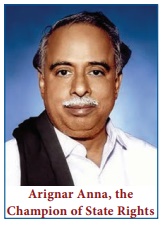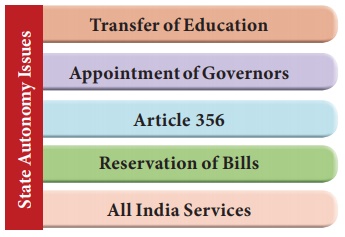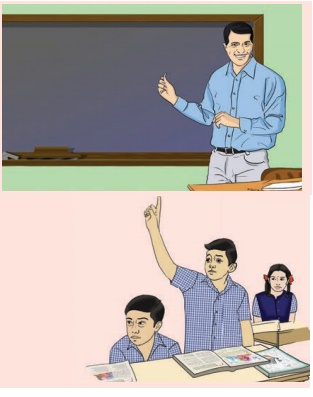Federalism in India | Political Science - Issues and Demands in Indian Federalism | 12th Political Science : Chapter 5 : Federalism in India
Chapter: 12th Political Science : Chapter 5 : Federalism in India
Issues and Demands in Indian Federalism
Issues and Demands in Indian Federalism
There are many issues in Indian federalism that
create disturbances in the Centre-State relations. We will focus on the major
problems in this section.
Appointment and Role of the Governor
The very office of the Governor as an agent of the
Central Government to monitor the State Government imperils the powers of the
constituent States.The Raja Mannar Committee Report was highly critical of the
office and role of governor. It is often pointed out that the Union Government to
arm -twist the State executive. The Dravidian parties, since the days of C.N.
Annadurai, have been demanding ‘genuine autonomy for the States, by reducing
the Governor’s power of interfering with the State executive and State
legislature.

The regional parties have deprecated the practice
of appointing politically active and partisan persons as governors. They have
frequently demanded that the governor should be appointed in consultation with
the State Government. Many political commentators and commissions have argued
for the appointment of eminent persons who have contributed to India’s
development in diverse fields as governors.
The attitude of the Governor towards the State Governments of those ruled by parties opposed to the ruling party at the Centre is another major tension area in Centre-State relations. Whenever there is a split in a ruling State party or hung assembly, the role of the Governor becomes very crucial and in many instances, the regional and opposition parties have agitated against the decisions of the incumbents in gubernatorial office.
Education
There is a popular demand that
the subject of education must be restored to the List II or State List in which
originally it was located. The Parliament in 1976 enacted the 42nd Constitutional
Amendment Act that transferred the subject of education to the List III or
Concurrent List. The State Governments exclusively had authority over education
when it was in State List and the Union Government acquire education after this
transfer. As we learnt earlier when a contradiction arises between the States
and the Central Government in the Concurrent List the authority of the Central
Government or Parliament will prevail. Many political parties in States like
Tamil Nadu are demanding the transfer of education back to the State List.

Reservation of State Bills for Presidential Consideration
The Governor of a State has discretionary power to reserve
a bill of the State legislature for the consideration of the President. Whenever
a money bill of the State legislature is reserved by the Governor the President
may either declare or withhold his assent. In case of other bills, he can
declare or withhold his assent. He can also direct the Governor to send the
bill for reconsideration to the legislature concerned. Even if the bill is
again passed by the State legislature it is not obligatory for President to declare
his assent. This provision was incorporated in the Constitution to protect the
unity and integrity of India.
But many State Governments have
criticized the Governors for reserving the duly passed State bills for the
consideration of the President as there were alleged to have been motivated by
political considerations to suppress the State Governments and to further the
interests of the ruling party or coalition at the Centre.
Improper use of Article 356
The article 356 in Part XVIII of the Constitution
provides for the proclamation of Emergency by the President in any State where
there is a breakdown of Constitutional machinery either based on the report of
the Governor or even otherwise. The article emphasizes on the supremacy of the
Constitution and national unity and integrity. The State Governments ruled by
the opposition parties of the ruling party at the Centre have complained
against the frequent and improper use of this article by the ruling party or
coalition at the Centre. More than a hundred times, the article has been used to
impose emergency in States and in many instances there was a huge complaint
that political and party considerations have led to the imposition of the
President’s Rule. Many regional parties have demanded the abolition of this
article. However, since the Supreme Court’s judgement in S.R. Bommai vs Union
of India case, the chances for misuse of article 356 drastically reduced.
All India Services
All India Services are created under article 312 of the Constitution. The officers to these services are recruited by the Union Government and posted in the States. The State Governments have powers of posting, transfer while the Central Government alone has powers to dismiss them. As the ultimate control over the All India Services are with the Central Government the State Governments have sought changes in the system and the Rajamannar Commission of Tamil Nadu government suggested a complete revamping in the structure and position of All India Services.
Activity: Conversation on Cauvery Dispute

Student: Sir, can you please explain us the Cauvery dispute?
Teacher: Cauvery dispute is an inter-State water dispute. It involves the states of Tamil Nadu, Karnataka, Kerala and Union Territory of Puducherry.
Student: What is the history behind the issue?
Teacher: The history of the issue is a long one. The Madras Presidency and the Princely State of Mysore signed an agreement in 1924 for sharing the waters. After being in operation for fifty years the agreement lapsed in 1974.
Student: Did the disputants hold negotiations thereafter?
Teacher: Yes, many rounds of negotiations were conducted for nearly two decades but no solution was reached. As we learnt earlier in the class, the Inter State River Water Disputes Act 1956 allows for the formation of a tribunal for resolving the river water disputes. The Cauvery River Water Tribunal was established in 1991 to solve the issue.
Student: Did the Tribunal deliver its Award? What are the features of its Award?
Teacher: Yes. The Tribunal gave the final Award in 2007. It stipulated a monthly release of water from Karnataka to Tamil Nadu across the border in Biligundlu. It fixed the share of each state from Cauvery River. It provided a distress formula to share the waters in years when rainfall is low allowing for proportionate sharing of the available water.
Student: What is the Cauvery management Board?
Teacher: The Tribunal provided a Cauvery Water Management Board to manage the tricky problem of sharing the water
Student: Has it been formed?
Teacher: After many years of litigation, the Supreme Court delivered the final verdict and directed the Union Government to constitute the mechanism to implement the Award. The Cauvery Water Management Authority and the Cauvery Water Regulation Committee were established in 2018 to implement the Award of the Tribunal as modified by the Supreme Court. At present Tamil Nadu is entitled to get 177.25 tmcft of water from Karnataka as measured in Biligundlu border. The total share for Cauvery water allotted to Tamilnadu is 404.25 tmcft. Karnataka is entitled to get 284.25 tmcft. Kerala’s share is 30 tmcft and the fourth disputant Puducherry will get 7 tmcft.
Related Topics